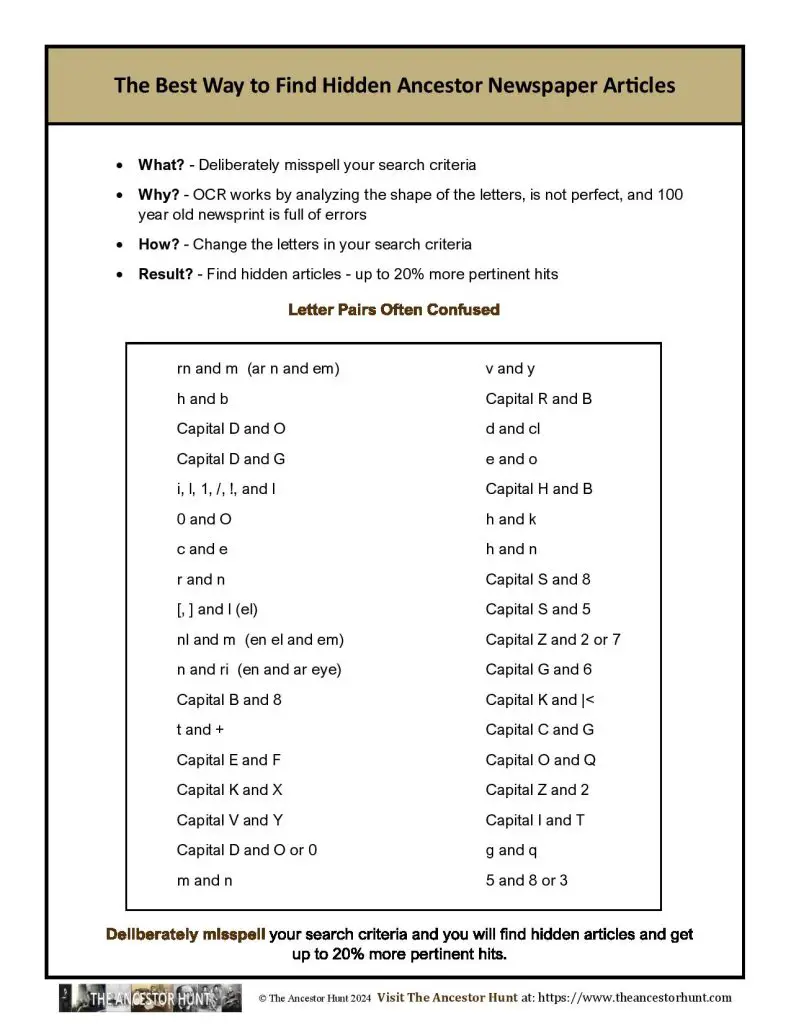
(This page's most recent update is August 2024)
Other than making sure that you are searching in the right place geographically and using a date range that fits your ancestors’ lives, what follows is the best way to find more ancestor articles when searching online historic newspapers.
If you do newspaper research online as part of your genealogy and family history pursuits, then you have certainly been puzzled by some of the search results (or lack thereof) that you have received.
The creation of newspaper images and the application of the OCR process do not always result in what you might expect in the index which is used to match your search criteria.
There is a simple explanation for this, and it all has to do with quality:
- Quality of the original material – was the newspaper old and brittle when scanned? Was it yellowed? Ripped or torn? Creased? Did it have dirt on it or lots of ink spots?
- Quality of the scan – the scan creates the digital image and from that, the index. Was it from the original paper, a microfilm of the paper, or worse a copy of the microfilm? Every additional copy or scan degrades the resulting image and when the OCR process is applied, the index suffers.
- Quality of the OCR software – some are more accurate than others.
- Quality of the writing in the original newspaper – did the author get your ancestor’s name spelled correctly?
- Quality of the typesetter – did the typesetter get every word from the author set up correctly?
Thus what you are searching for probably won’t be a perfect digital database that represents what was originally written by the author and newspaper publisher.
What can we do about it? There are lots of things to try and this article deals with changing the letters in your search criteria. For example – if the surname you are searching for is “Wilson” and the letter “n” is often converted to the letter “m” in the index from the OCR process, why not search for “Wilsom”?
I guarantee that changing your search letters will lead to an improvement of at least 5 to 10% in search results. I heard from one reader that changing letters and letter pairs got them a 20% improvement!
My suggestion? Change your search criteria and exchange the letter string you are entering in the search box to include alternative letter and letter pairs and see what happens. In other words – deliberately misspell the name or word. You will be pleasantly surprised!
Try out these letter replacements:
| rn and m (ar n and em) h and b Capital D and O Capital D and G i, l, 1, /, !, and I 0 and O c and e r and n [, ] and l (el) nl and m (en el and em) n and ri (en and ar eye) Capital B and 8 t and + Capital E and F Capital K and X Capital V and Y Capital D and O or 0 m and n 5 and 8 or 3 | v and y Capital R and B d and cl e and o Capital H and B h and k h and n Capital S and 8 Capital S and 5 Capital Z and 2 or 7 Capital G and 6 Capital K and |< Capital C and G Capital O and Q Capital Z and 2 Capital I and T g and q |
Download the Quicksheet PDF
To see what letter pairs are often confused and exchanged in the index, download a one-page Quick Reference Guide by clicking on the Download button below:
For other ways to improve your search results and to learn much more about becoming an expert newspaper researcher, check out the Newspapers Page.
Genealogy QuickSheets – Frequently Asked Questions
- 100 Best Free Online Genealogy Websites
- Beyond the Search Engine: Using Google Databases for Genealogy Research
- 64 Genealogy Items to Collect from Your Home
- United States Genealogical and Historical Societies
- 24 Places Where You Can Find Your Ancestors Occupation
- 13 Types of Genealogical Information You Can Find in Old Yearbooks
- 16 Places Where You Can Find Genealogy and Family History Books
- Easy Cousin Relationship Chart
- The Easiest Way to Find Every Historical Newspaper in America
- The Best Way to Find 20% More Pertinent Newspaper Articles Online
4 replies on “The Best Way to Find 20% More Pertinent Newspaper Articles Online”
Sometimes u is read as n. I’ve found my Shauger relatives using Shanger in newspaper research.
I always check the ocr derived text to see how other names in an article of interest have been scanned. I then use that character string, no matter how bizarre, to search for any names of interest. Works particularly well in the run of a specific publication.
In the 1940 census my family names are misspelled and were very difficult to find. After much looking here is how they were spelled. Only one letter off but it took a lot of looking to find them.
Rolls is shown as Rolla
Stubbs is shown as Stubbe
Thanks for the confusing letter pairs guide. Sometimes the newspapers are very difficult to read, but well worth trying.